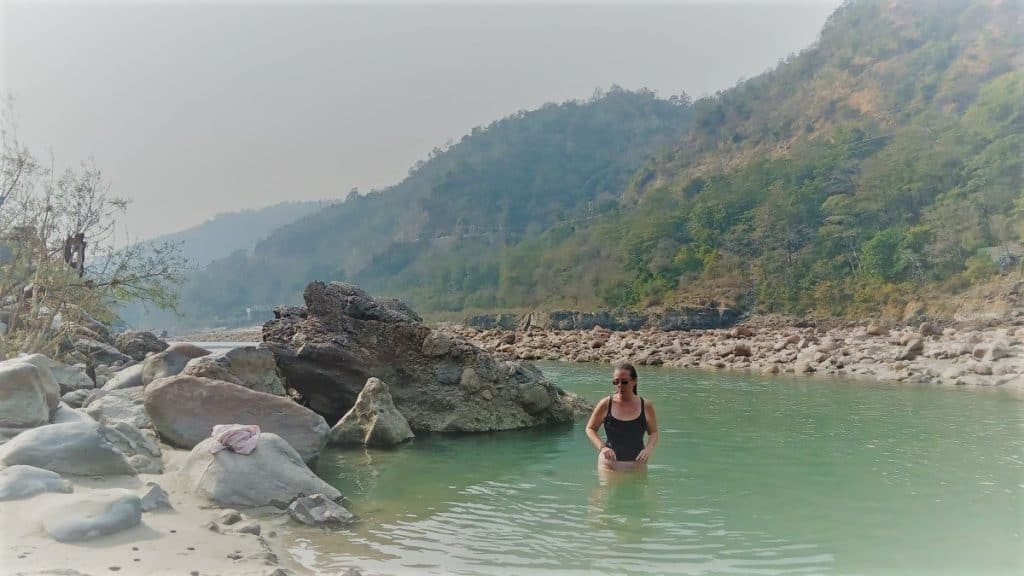Last Updated on October 25, 2024 by Ellen
Fresh, cool morning air filters into the apartment, slowly clearing the stuffiness from yesterday’s 100+ degree heat. It’s the start of another day in northern India – another day full of possibilities. We are in a special place with good vibes tucked between the start of the Himalayan range and the banks of the Hindu holy river named Ganges. Our days are relaxed in a slow travel routine that falls in line with the rhythm of Rishikesh.
Different rhythmic beats pulse through Rishikesh, known as the Gateway to the Garhwal Himalayas. Constant icy water flows down from the mighty mountains as wind pushes up the hills. At all hours, cows clomp up around with an occasional pause to make guttural declarations of calling up cud. And cow waste is ubiquitous, so watch where you step.
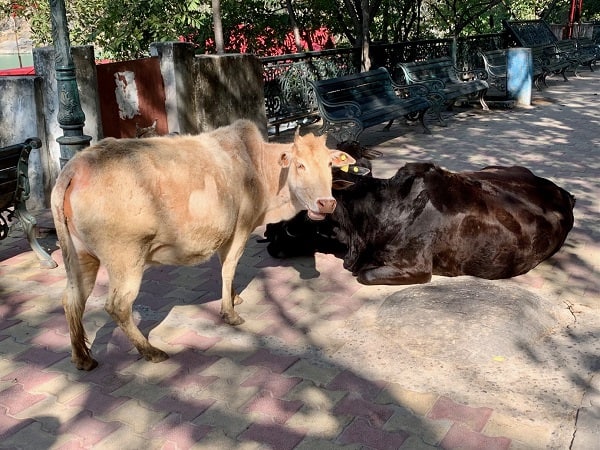
Early morning guided meditation makes for a mindful start to the day; quiet yoga students make their way to class. Rishikesh is nicknamed Yoga Capital of the World. It is also a mecca for those in search of higher knowledge, who want to move away from materialism, like The Beatles did when celebrity life became too much and they sought refuge in an ashram on the banks of the holy river, also called the Holy Ganga.
Every morning, sages and spiritual seekers bathe in the Ganga against the backdrop of temples and ashrams along the river from the city up into the mountains. Dunk yourself three times for the absolution of sins past, present, future.
By mid-morning, those sadhus and sadhvines (holy men and women) head to centers for free meals, their saffron wraps eye-catching whether they’re near the aqua-blue river and greenery or on a city street.
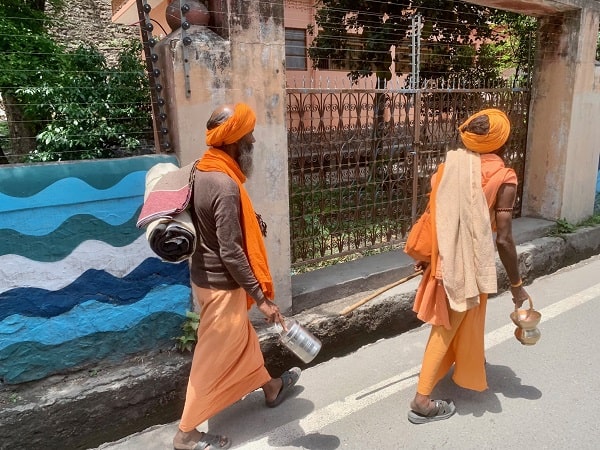
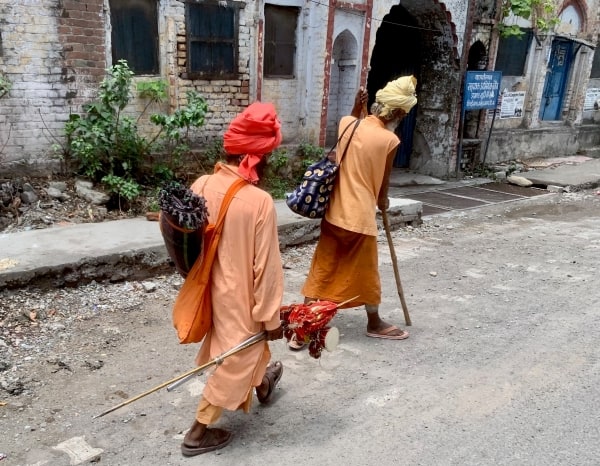
These sadhus are devoted to disciplining their senses — they’ve renounced worldly life. They believe attachment is the root cause to materialism and greed. True sadhus will not beg. They believe God will provide before asking is needed. However, it’s a tough effort, and sometimes they ask with their eyes for a donation. To call them beggars is crude. It sounds better to call them mendicants.
By late morning, the rhythm of material life gets loud. Stores and shops are open, motorcycles race up and down the steep narrow roads (more like alleys) in the Tapovan neighborhood. Monkeys screech when food cart operators chase them away. It’s a game they’ll play all day, monkey and man.
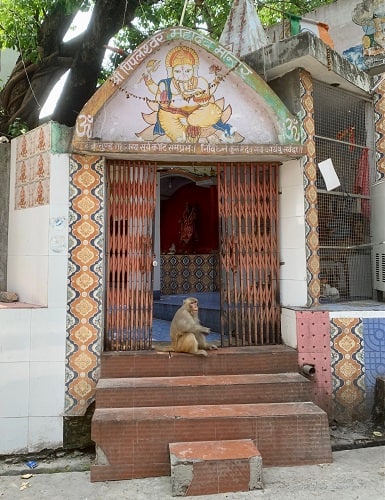
On the main road through Tapovan that leads to the city proper, it’s even louder. Horns are incessant shrill announcements that hurried Indian drivers or motorcycle riders are not going to stop for you – or for anything except a holy cow. Pedestrians do not have the right of way, so look both ways – and in front and back – 10 times at every crossing.
Rishikesh’s residents number about 320,000. That is an unofficial number, and dramatically higher than 100,000 people counted in the country’s last census in 2011. The pandemic delayed the 2021 census. If current estimates are correct, Rishikesh today is about the size of Orlando, Florida. For India, the world’s most populated country, that’s more like a town.
Morning rush-hour traffic to go from Tapovan past Ram Jhula (suspension bridge) and Jonke Bridge to the market in the city proper can take one hour because the two-lane road is narrow and choked with bicycle carts, cows, rickshaws, scooters, cars, trucks, buses, pedestrians, monkeys, people. Weekends are horrendous on that same narrow road in the other direction — from Tapovan up into the mountains. It is absolutely jammed with vehicles stuffed with devotees on pilgrimages or tourists seeking thrills of whitewater rafting. Tourists and pilgrims make parts of Rishikesh feel more crowded than Orlando.
On Thursday and Friday late mornings, Indian tourists from New Delhi arrive, luggage in tow. They inquire about whitewater rafting during their long weekend trip at tour shops. Spiritual purification and adventure on the Holy Ganga make a good rhythm for a special package sale. There are countless adventure tour shops throughout the entire city.
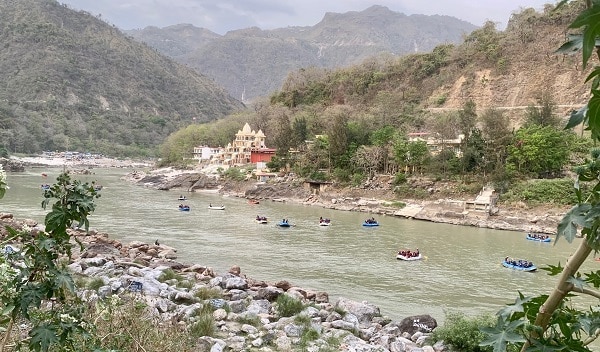
Rishikesh is fifth in India for drawing in international tourists, after Varanasi, Dharamshala, Agra, and Goa. In the hills of Upper Tapovan and Lower Tapovan, the foreign tourists who stay at ashrams, home stays, hotels and hostels are on their own self-realization journeys in this worldly life.
The only bank in the neighborhood opens its shutters in late morning, and these tourists line up to withdraw money from the ATM and then get smaller bills inside the bank. These tourists try not to notice the beggar children with filthy bare feet and too-skinny limbs. The beggar children’s rhythm: “Chapati, chapati,” as they push their hands towards their small mouths, as if to say they will spend any money they get on a cheap bread akin to tortillas.
Noontime begins the peak hours of an awakened Rishikesh stuck in worldly life. The afternoon heat in May can be severe, which can match a hiker’s thirst. The power goes out often. Shops and restaurants use inverters with batteries or generators that hum with a rhythm of promised comfort.
Afternoon retreats to the banks of the Holy Ganga refresh the body and soul. Just watch out for the Ganga’s strong current that sometimes carries away the occasional devotee into the next incarnation. Around the times when these tragedies happen, foot-patrolling police blow whistles to make tourists stay off the beach and rocks, and get out of the water. Yet: those paying whitewater customers float by in life jackets and helmets near their rafts. They whoop with pleasure in the icy water. Their shrieks of delight form an unnatural rhythm that jarringly echoes in the river valley.
The valley’s vibe changes again at dusk, when it slows a bit and becomes more spiritual. That’s arti time on the banks of ‘Maa Ganga’ – a Hindu ritual to honor gods. It includes lifting light (flames) to the sky as darkness falls. Songs, chants, peace permeate the valley. As night falls, the rhythm picks up again.
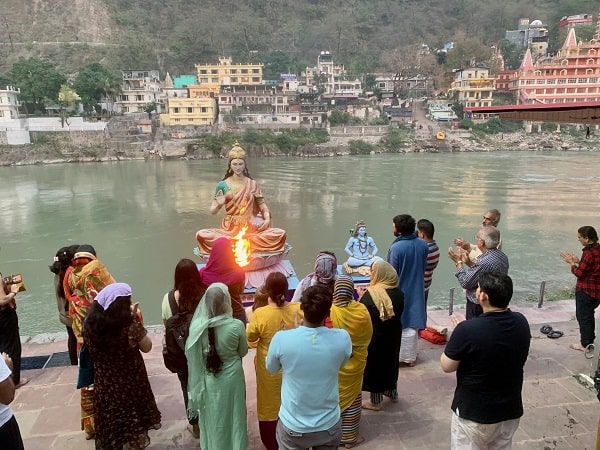
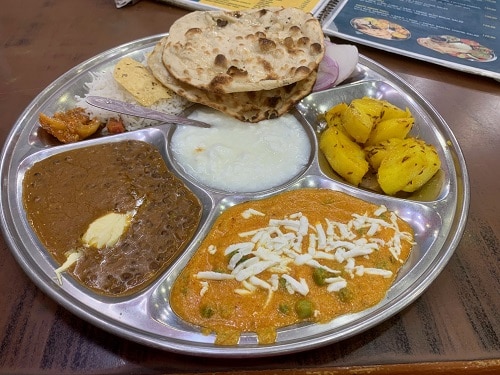
People pack out Indian restaurants, momo food carts, street-side pizza ovens. It’s dinner time. Rishikesh means ‘Lord of the Senses’ in Sanskrit. Everyone is hungry for something.
Tourists fill restaurants with Beatles themes and river views with their chatter over plates of dinner. Less expensive, open-air fast food joints serve delicious vegetarian thali platters for less than $2 in the 2023 calendar year. Hindus are vegetarians: there is no meat or alcohol anywhere near Holy Mother Ganga.
Nighttime eventually goes soft. Skies are clear enough to see stars. The colors, the sounds, the smells, mostly get tucked under a cloak. A dog barks as I drift between sleep and the present moment on the bed, alone, and hot despite the fan, the spouse in the next room, looking up something online. A cow calls up cud right outside my window. It sounds like a monster in a movie. Temperatures drop and eventually allow for another fresh start to a new day full of possibilities again tomorrow.
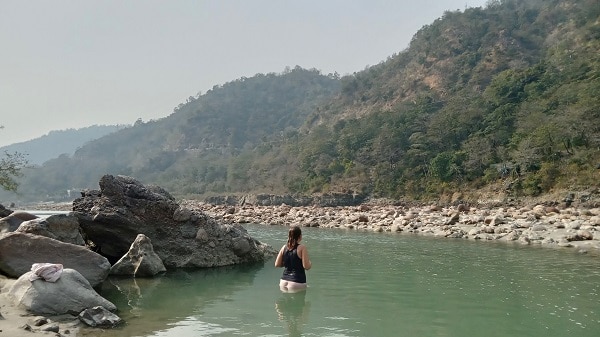
Thanks for reading, “The rhythm of Rishikesh.”
Check out the climate catastrophe countdown clock below. We recommend ‘The Climate Book’ for enlightenment.

